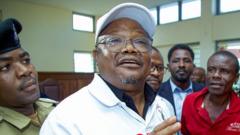Opposition leader Tundu Lissu, recently charged with treason, finds himself in a critical struggle against the Tanzanian government as he pushes for reform ahead of imminent elections. Lissu's party, Chadema, has been barred from contesting the election, leaving him detained and navigating through a politically hostile landscape.
Tundu Lissu's Legal Battle and Tanzania's Political Turmoil

Tundu Lissu's Legal Battle and Tanzania's Political Turmoil
Prominent opposition leader Tundu Lissu faces grave charges as tensions escalate in Tanzania ahead of crucial elections.
Chadema leader Tundu Lissu, a formidable figure in Tanzanian politics, is once again in the spotlight following treason charges that could lead him to the death penalty. Known for his struggles against the oppressive political climate, Lissu remains resilient, aiming to provoke government reforms before the impending presidential and parliamentary elections in October. Dismissed from the political race and currently in detention, he faces mounting challenges as he builds a case against the ruling party's seemingly unbreakable hold on power.
In 2017, Lissu survived an assassination attempt that marked him as a staunch survivor. His pursuit for reforms intensified after claiming leadership of Chadema, where he criticized his predecessor for conciliatory approaches towards the ruling CCM party. However, his fiery rhetoric has led to serious legal ramifications, including charges stemming from a controversial speech that purportedly incited rebellion.
Chadema's disqualification from the upcoming elections, due to a refusal to adhere to a strict electoral code, has raised alarms about the fairness of Tanzanian politics. Reports of violence against government critics, including the brutal killing of prominent party members, underscore the grave risks involved in opposition efforts. Calls for Lissu’s release have been amplified by human rights groups and the Catholic Church, amidst promises from the government for fair elections that many doubt will be honored.
Lissu believes a comprehensive reform agenda is necessary to ensure free elections, demanding an independent electoral commission detached from government influences. However, dissent within Chadema complicates matters as factions adopt varying stances toward engagement with the government, with some urging participation in the elections regardless.
With the October elections approaching and uncertainty cloaking the political atmosphere, Lissu's gamble for bold reforms faces the daunting challenge of fostering public support in a reluctant populace. Analysts warn that failing to adapt could risk Chadema's position as the leading opposition party, potentially empowering new rivals in Tanzania's political landscape.
In 2017, Lissu survived an assassination attempt that marked him as a staunch survivor. His pursuit for reforms intensified after claiming leadership of Chadema, where he criticized his predecessor for conciliatory approaches towards the ruling CCM party. However, his fiery rhetoric has led to serious legal ramifications, including charges stemming from a controversial speech that purportedly incited rebellion.
Chadema's disqualification from the upcoming elections, due to a refusal to adhere to a strict electoral code, has raised alarms about the fairness of Tanzanian politics. Reports of violence against government critics, including the brutal killing of prominent party members, underscore the grave risks involved in opposition efforts. Calls for Lissu’s release have been amplified by human rights groups and the Catholic Church, amidst promises from the government for fair elections that many doubt will be honored.
Lissu believes a comprehensive reform agenda is necessary to ensure free elections, demanding an independent electoral commission detached from government influences. However, dissent within Chadema complicates matters as factions adopt varying stances toward engagement with the government, with some urging participation in the elections regardless.
With the October elections approaching and uncertainty cloaking the political atmosphere, Lissu's gamble for bold reforms faces the daunting challenge of fostering public support in a reluctant populace. Analysts warn that failing to adapt could risk Chadema's position as the leading opposition party, potentially empowering new rivals in Tanzania's political landscape.





















